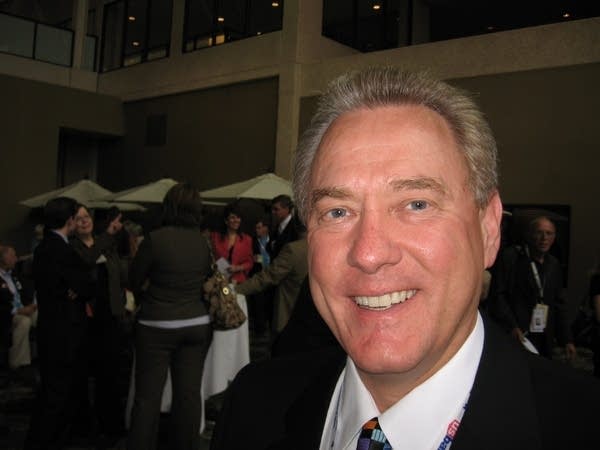Parties see wave of donations as Pawlenty axes tax refund

Political parties in Minnesota have seen a surge in donations after Gov. Tim Pawlenty's plan for balancing the state budget included a proposal to eliminate a tax refund for political contributions beginning July 1.
Since 1990, Minnesota residents who donated to a political party or a candidate for state office were eligible to receive a tax refund of up to $50 for individuals filers and $100 for couples.
With that incentive to donate likely to go away, Minnesota's major political parties are alerting potential donors.
Ron Carey, the outgoing chairman of the Republican Party of Minnesota, said those alerts include a website message as well as individual e-mails and phone calls. The state GOP had raised nearly $15,000 toward a $25,000 goal.
Create a More Connected Minnesota
MPR News is your trusted resource for the news you need. With your support, MPR News brings accessible, courageous journalism and authentic conversation to everyone - free of paywalls and barriers. Your gift makes a difference.
"I think you're seeing a lot of activity going on," Carey said. "But I think it's mostly focused on people's active donor file, those who have been there year in and year out, making sure they don't wake up on July 1 and say, "Oh I can't do this anymore? I wish I would have known.'"
Data compiled by the Minnesota Campaign Finance Board show the political contribution refund has been good for Republicans. The most recent available results from 2007 show the Minnesota GOP received $2.2 million through the program, compared to $955,000 for the DFL and $13,000 for the Independence Party.
"Most members of the party think it's only fair that political parties can get by with less."
Carey said he's not overly concerned about coming up short this year. He said he's confident the Republican message -- and the party's overall fundraising effort -- will continue to bring in checks.
"If somebody is willing to give you a rebate on your contribution, most people are going to say I'll take it," he said. "But that may not be the motivation as to why they gave in the first place."
Jack Uldrich, chairman of the Independence Party of Minnesota, also downplayed the impact of the tax refund elimination. He said he thinks the loss of the program will have a negative effect, but several of the party's candidates for federal office have done reasonably well without the state refund, or any special interest contributions.
Uldrich said he thinks candidates for governor and other state offices can do the same.
"The (refund) was a net positive and we're sorry to see it go away," he said. "But at the same time, we understand the fiscal situation the state is in. So, most members of the party think it's only fair that political parties can get by with less."
Still, Uldrich also alerted potential donors last week that the refund would soon end, and he asked them for a contribution. He said more than $1,000 came in the first day.
Pawlenty is eliminating the tax refund as part of his larger plan to erase a $2.7 billion budget deficit on his own using the process known as unallotment.
During his weekly radio show last Friday, Pawlenty said he's heard more comments about that particular cut than any other. Still, the governor said the political refund, which costs the state $10 million each budget cycle, is not a priority.
"In these challenging economic times, when we're trying to set priorities, I don't think subsidizing that program is more important than trying to keep some of our other things, like funding our schools and our health care programs," Pawlenty said.
Some of the sharpest criticism over the cut came this week from Common Cause Minnesota. Mike Dean, the executive director of the non-partisan government watchdog group, said the tax refund has been a valuable way to engage average people in the political process. Dean said he's concerned big money will now have a bigger influence on candidates.
"Our worry is that it's going to make it even more difficult for candidates to raise money during the governor's race but even the state legislative races," Dean said. "So they're going to have to spend a lot more time then out there raising money from these big wealthy donors and these big special interest groups, and we think that's really going to skew the policy."
Dean said he hopes the Legislature restores the political contribution refund during the 2010 session.
A message seeking donations before July 1 is also prominent on the Minnesota DFL web site, but a DFL spokesman said party officials were not interested in commenting for this story.
